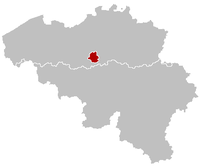Brussels

Brussels (French Bruxelles, Dutch Brussel, German Brüssel) is a major city in Belgium and its capital.
Contemporary Brussels
Brussels is first a city located in the center of Belgium, but it sometimes refers to the main municipality of the Brussels Capital-Region city. This municipality inside Brussels is correctly named The City of Brussels (Bruxelles-Ville or Ville de Bruxelles in French, de Stad Brussel in Dutch), which is one of 19 municipalities that make up the Brussels Capital-Region.
See also: List of municipalities of the Brussels Capital Region.
The Capital Region is a region of Belgium in its own right, alongside Flanders and Wallonia, and is geographically an enclave of Flanders. On January 1, 2003, the region had a population of 992,041 for 161.382 km² which gives a population density of 6,309 inhabitants per km².
Although not part of Flanders, Brussels is its administrative seat. After their creation, the Flemish regional and community institutions were united, and the unified Flemish legislative council, the 'Vlaamse Raad', now called 'Vlaams Parlement' established its government and ministeries in Brussels. Brussels is also the capital of the French Community of Belgium (Communauté française Wallonie-Bruxelles in French).
Two of the three main institutions of the European Union, the European Commission and the Council of the European Union, have their headquarters in Brussels. The third main institution of the European Union, the European Parliament, also has parliamentary chambers in Brussels (its plenary sessions are held in Strasbourg). This leads to a another meaning, especially in British English, where the city is used as a metonym for some aspects of the Union. "Brussels is considering banning raunchy TV images"
Brussels is also the political seat of the NATO, the North Atlantic Treaty Organisation, and the Western European Union (WEU).
The language frontier divides Belgium into a northern, Dutch-speaking, region and a southern, French-speaking, region. The Brussels region is officially bilingual. The area, which is geographically situated in the south of Flanders, was mostly Dutch-speaking until the beginning of the 20th century. Over the 19th century, more and more French-speaking civil servants coming from Wallonia settled in Brussels and persistent social, administrative, cultural and political pressure made many Flemings switch their vernacular to French. Today the majority of its population speaks French. Smaller immigrant communities still speak the mothertongue of their country of origin, being Berber, Arabic, Italian, Spanish and others, but a lot of them are also french-speakers.
Brussels is served by Brussels International Airport, located in the municipality of Zaventem.

See also: List of Minister-Presidents of Brussels, Brussels sprout, Grote Markt / Grand-Place, La Monnaie, Atomium, Manneken Pis, Belgian cuisine.
History
The Brussels Capital Region is home for both French- and Dutch-speakers. French was for several centuries only spoken by the haute-bourgeoisie and the nobility. It became only a popular language under the French regime, and after 1830, by the immigration of many French (revolutionnaries and others) and many Walloon, attracted by the new Belgian authorities. As in 1830, only the haute-bourgeoisie and the nobility (less then 1% of the population) had voting rights, these groups wanted to fashion the new state along their personal preferences. As a result, they had to attract many French-speaking Walloon to man the public services.
Universities
Brussels has several universities, two of them being the Université Libre de Bruxelles (ULB) and the Vrije Universiteit Brussel (VUB).
Miscellaneous
Brussels hosted the third Congres Internationaux d'Architecture Moderne in 1930.
Brussels metro dates back to 1976.

